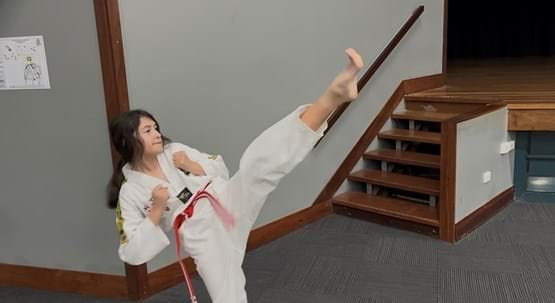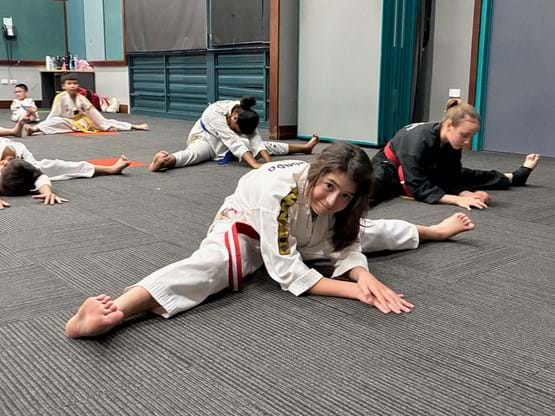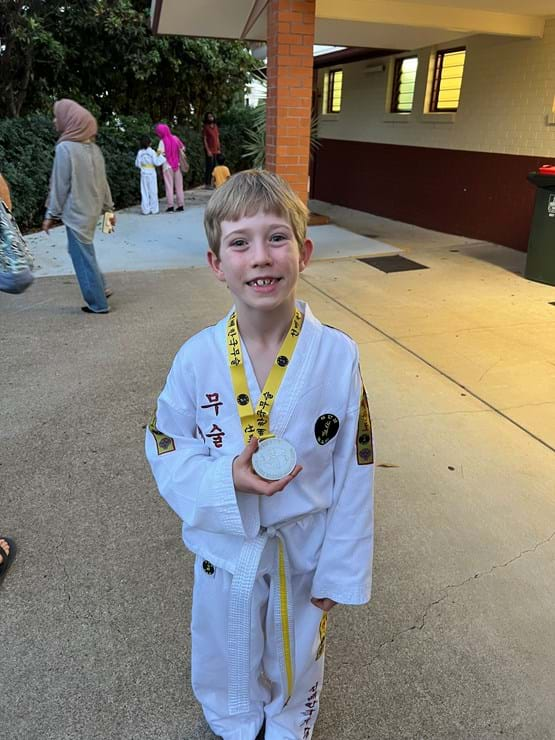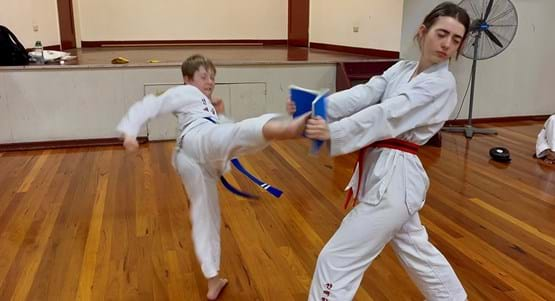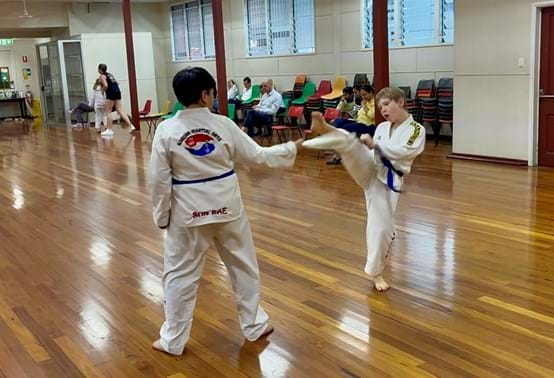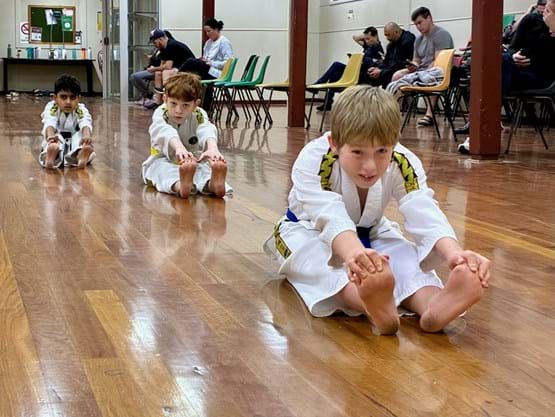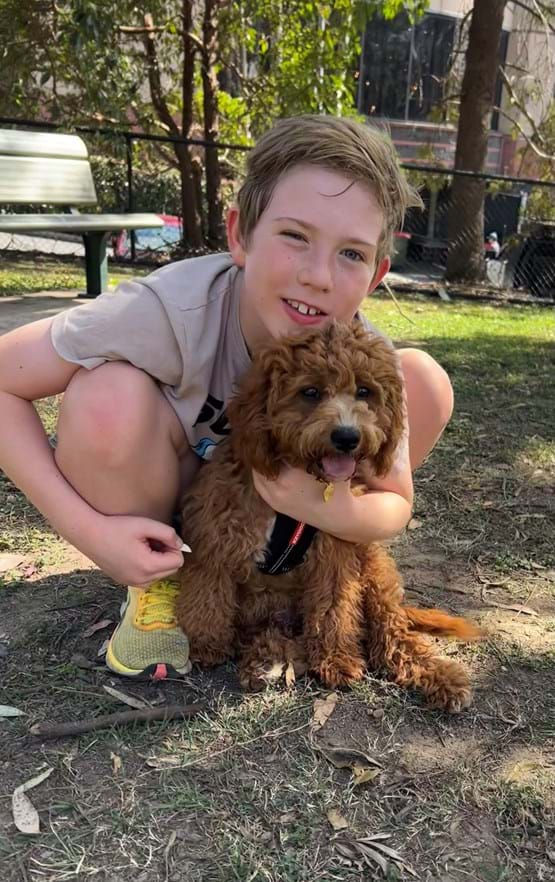Martial arts: from distraction to direction
Over time, it is clear there has been an increase in the number of new students who suffer from attention disorders. Mostly they are children and adolescents. With open arms are these students welcomed, of course, "concentration" and "discipline" part and parcel of the traditional martial arts training at Sun Bae Korean Martial Arts.
It has been widely researched and well-documented that a necessity to successful education, especially for Attention Deficit Hyperactivity Disorder (ADHD) includes:
- structured classes;
- routines;
- broken-down tasks; and
- hands-on activities.
A traditional martial (as opposed to a martial sport) strives to instil "focus", "concentration", "self-control" and "self-esteem", all via a structured training regime. Students line up in order of rank, hence they immediately know their place. Students learn in a controlled disciplined environment, lacking in the chaos often found in sports' classes. Students are encouraged to set goals by grading to higher ranked belts, hence they are motivated to succeed. Students are only competing against themselves, striving to be be better than their last class.
Studies have shown that Taekwondo training increases selective attention and cognitive control, and controls impulses in individuals with ADHD [1,2,3]. In addition, Taekwondo also enhances cognitive function and physical balance in older adults [4,5,6]. At Sun Bae Korean Martial Arts, our training program is designed for a wide range of children, especially those with differing focus abilities. Discipline is not just encouraged, it is enforce (nicely). Students are required to strictly adhere to the Rules of School, which naturally enhances the enjoyability for all.
Sun Bae Korean Martial Arts is a large school (400+ training members) with a long history and of course, there are a number of students with ADHD. We asked two students what they think of Taekwondo training at Sun Bae. Parents were also interviewed, happily sharing how Taekwondo has impacted their children. We thank the parents for their contributions and for their ongoing support for Sun Bae.
Following is our interview with Lea and Lucas, both was diagnosed with ADHD. Lea is a red belt from Kenmore and Lucas is a blue belt from Newmarket. Both have to date performed highly at their grading tests, receiving a mix of "Honours" and "High Pass" since joining.
Hi, I am Lea. I am 11 years old and I admire animals.
Q: Had you tried other activities before you started Taekwondo?
Around the time I started taekwondo, I also attended piano lessons.
Q: Do you remember your first ever Taekwondo lesson? Please tell us about it?
Whenever I was corrected, I got sort of angry.
Q: What do you like about doing Taekwondo?
What I like about Taekwondo is learning self-defence, so I know how to protect myself if someone tries to hurt me.
Q: Do you think Taekwondo benefits you? If yes, how?
I agree that Taekwondo benefits me, as a low muscle tone person, that way, I grow muscles.
Q: How do you cope with challenges in Taekwondo class?
I take some deep breaths, but sometimes it doesn't work.
Q: What is/are your favourite activity/activities in class?
My favourite activity is pad kicking.
Q: Do you have a pet? If yes, name?
I own a pet cat named Milk.






From Lea's parents
Q: How does Taekwondo benefit your child? Please elaborate?
I truly believe that Lea has benefited from what Taekwondo has to offer. Not only I saw a significant improvement in her physical strength (due to low muscle tone), endurance but also her coordination skill. There were certainly some tough times and hoops for Lea to jump through that discouraged her. However, she has never given up. It may have taken her more trials to pass than her peers, but Lea has definitely given her best, with (Master) Shirly supporting during her Taekwondo journey. She wishes to achieve the black belt one day.
Q: Is Taekwondo too hard to learn?
No, I do not think so. Most kids in her class could learn Taekwondo quite quickly. Technique, on another hand, might be more difficult to learn.
Q: What do you think parents have to do to ensure your child stays motivated/interested?
Kids, nowadays, have so many choices and options to choose. As kids progress, they might grow out of the Taekwondo interest and search for a different more "interesting" venue. I think this is normal. I always let Lea decide what she likes and whether she wants to continue after trialling. Some activities do fit her, some don't. Taekwondo is one of a few activities that Lea has been able to continue and progress for the past 5-6 years. She also set her goal to achieve black belt and she continues to work towards it. That is one of the key motivations for her I believe.
Hi, I am Lucas, 10 years old.
Q: Had you tried other activities before you started Taekwondo?
Yes. Hip-hop and break dancing, swimming, running (park run junior) and baseball after starting Taekwondo. Had a go at guitar, but never practised, so dropped out.
Q: Do you remember your first ever Taekwondo lesson? Please tell us about it?
Yes. I felt nervous and scared at the start. But Master Shirly helped me with stretches and kicks. And at the end of my trial, I felt better and wanted to continue, even though my sister didn’t.
Q: What do you like about doing Taekwondo?
Making new people feel welcome. Talking to my friends I have through Taekwondo. My favourite part is when we get to try and break a board with a kick.
Q: Do you think Taekwondo benefits you? If yes, how?
Helps to release frustrations after a hard day at school with emotions. Helps me focus outside of Taekwondo. Gives me more confidence.
Q: How do you cope with challenges in Taekwondo class?
Keep trying and not quitting. Get help from Master Shirly and take feedback constructively. Let off steam with my parents.
Q: What is/are your favourite activity/activities in class?
I like getting the pads/protection out and then trying to kick my partner in contact sparring. Breaking boards with kicks.
Q: Do you have a pet? If yes, name?
Yes, a recently purchased Toy Cavoodle 5 month old Puppy called Bailey.





From Lucas' parents
Q: How does Taekwondo benefit your child? Please elaborate?
Lucas benefits from the structure of Taekwondo and it helps to get him out of the house and away from TV. It makes him busier, but helps to organise himself better out of necessity (e.g. he has to plan when he does his homework around his Taekwondo sessions). Lucas also benefits from the precision involved in Taekwondo, the rules and ethics associated with the discipline, which helps to reinforce similar values we try to impart on Lucas, such as respect for all, especially teachers and seniors, and doing your best and trying to be your best in whatever you do. Not the best, but your best.
Q: Is Taekwondo too hard to learn?
No, it is suitably challenging. We like that it is a struggle at times, with difficulties to overcome. I feel true life satisfaction is about overcoming struggle and challenge, not being comfortable 100 % of the time. The patterns look very complicated, but I have always been impressed how Lucas has managed to remember these. This goes for other newcomers I have observed too, who struggled for a week or 2 at the beginning, but sure enough have battled away to be yellow and then blue belts.
Q: What do you think parents have to do to ensure your child stays motivated/interested?
Ride the ups and downs, and shrug off the meltdowns (we have gotten better at this with Lucas over the years especially since his ADHD diagnosis 3 or 4 years ago). We try to play the long (very long) game, and not make too much of an individual session or week, with an aim to keep him interested for the long term, peaking as he gets older and more mature/better at self motivating. This is true for his schooling too. We also let Lucas make his own mistakes, claim his successes and totally be guided by Master Shirly, who we feel is suitably strict and very fair. If Lucas gets approved to grade, then he truly deserves it and if he doesn’t, then that is a fair message to work harder if Lucas wants success.
Note from Master Shirly: As we can gather from these interviews, children, even with similar conditions, are different. In the few years of coaching Lea and Lucas, I have never found them any more challenging to teach compared to other students. In fact, they are some of my better students. I am very proud of their achievements this far. They show up to class no matter if it was a good or bad day. I think such resilience should be enforced at a young age. Children, with or without ADHD, who truly want to achieve something, can do it. I believe Taekwondo practice can benefit everyone, and this is from my personal experience too. Taekwondo goals keep me motivated and challenges me to do better even after I attain Black Belt.
Note from Master Bradley: I have always taken the approach (instructing since 1984) to normalise students with any conditions. Naturally it is in the back of my mind when teaching, but I have found that by treating them no differently to other students, they tend to act no differently. Learning may be more challenging, perhaps, but if they are willing to persevere and dedicate, then so am I. Interestingly, I had one father who had brought his son from another school. The father told me quite insistently that his son was unable to learn or perform any pattern and his old school just allowed him to grade without performing them. The son was a blue belt and the patterns were complex, of course. Only some months later, before testing, I showed the father his son performing (without assistance) his entire blue belt pattern (correctly). It was somewhat an emotional moment. Everyone can learn, just not at the same pace. Have faith. To give up (in any way) is to not be a true martial artist (which goes for the student and the teacher). It was nice to see that lad smile, most rewarding!
References:
- Kadri et al. Effect of Taekwondo Practice on Cognitive Function in Adolescents with Attention Deficit Hyperactivity. Int J Environ Res Public Health. 2019 Jan 12;16(2):204. doi: 10.3390/ijerph16020204
- Castro and Morocho. Exercises to reduce hyperactivity in children aged 7-9 years who practice taekwondo. Vol. 6 (2024)
- Knight et al. Does Taekwondo improve children's self-regulation? If so, how? A randomized field experiment. Dev Psychol. 2022 Mar;58(3):522-534.
- Cho and Roh. Taekwondo Enhances Cognitive Function as a Result of Increased Neurotrophic Growth Factors in Elderly Women. Int. J. Environ. Res. Public Health 2019, 16, 962
- Li et al. Impact of Taekwondo training on cognitive and physical function in elderly individuals: A comprehensive review of randomized controlled trials. Complementary Therapies in Clinical Practice. 2024. Vol 57, 101878
- Li et al. Taekwondo Poomsae practise in slow motion and the balance of healthy older adults: A Pre‐Experimental Study. Physiother Res Int. 2023;e2027.




